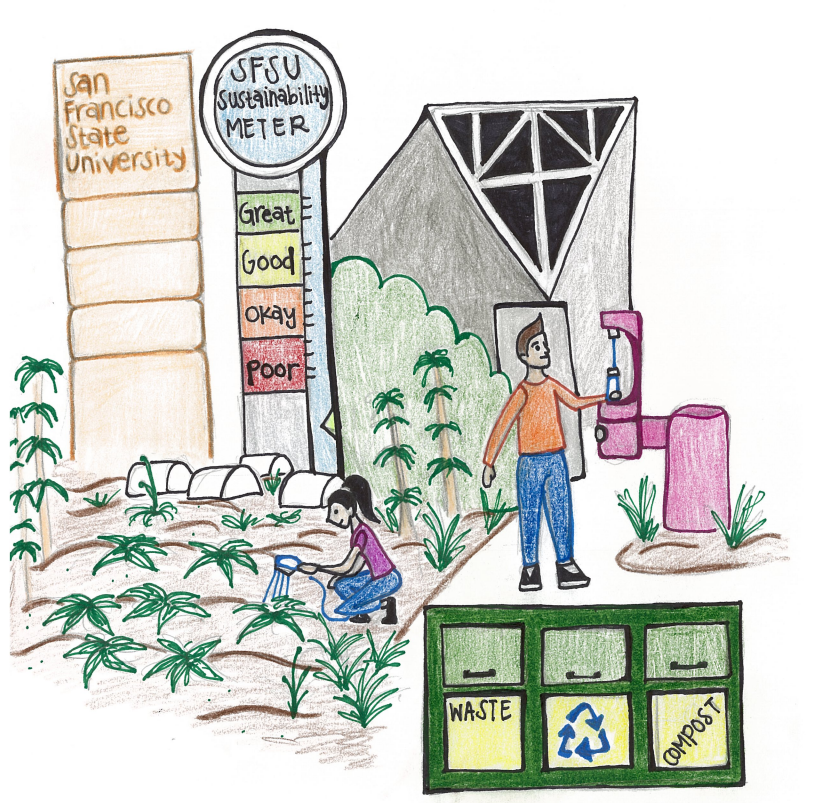The Office of Sustainability at SF State will submit a report February 1 to participate in a sustainability rating program that tracks and assesses efforts for maintaining a food and waste sustainable and environmentally friendly campus, according to an SF State campus memo.
STARS, or Sustainability Tracking Assessment and Rating System, is the program offered by the Association for the Advancement of Sustainability in Higher Education that will evaluate and report on SF State’s sustainability and environmental efforts. AASHE is a non-profit organization that encourages and equips students, faculty and administration with resources for making campuses more sustainable, according to Nikia Johnson, member services manager for AASHE.
“I think AASHE is an important organization because our goal and our mission is to help inspire and help lead global sustainability transformation, and what better way to do that than reaching out with students,” Johnson said.
According to Nick Kordesch, sustainability specialist for SF State’s Office of Sustainability, the university has been a member of AASHE for “several years,” however, it is the school’s first time submitting a STARS report. The goal is to gain access to AASHE’s full list of resources and be given a rating for the current level of green efforts and sustainability.
The aim of submitting the report to the STARS program is to use the rating SF State will receive as a guide for what the campus needs to work on in order to improve eco-friendly practices and renewable resources, according to Kordesch.
The research and report process requires the school to collect and measure data on the campus’ eco-friendly efforts, such as organic food consumption, composting, recycling and green building — and then compile it in a report for AASHE to asses, according to Johnson.
“It required us to look at the sustainability work that is being done by other departments all around campus. We did a lot of outreach and interviews with people like custodial managers, professors and ground staff,” Kordesch said. “Some sustainability information was easy for us to find, like our energy use and our green transportation statistics … but some of the credits were challenging.”

These “credits” or sections of the report that need to be submitted to STARS include topics such as curriculum, campus engagement, diversity, operations, affordability and wellness, according to Kordesch.
The sustainability specialist has also been accepting peer reviews for the report from staff, faculty and students, to gain a better understanding of renewable and sustainable practices in campus investment, administration and outreach operations, according to the memo.
“So far, we have had staff and faculty doing most of the review, but we have had more student input in writing the report,” Kordesch said.
When the report is submitted, AASHE will rate the school using a point-based system.
Once the data is completed and the report is sent in, the rating system will either give the campus a platinum, silver, gold or bronze rating, then the school will receive information, resources and kits to help make the campus more sustainable.
“For example, students can go on the hub and see what [environmental] initiatives they can lead, and it is a great resource to see what the campus needs to improve on,” Johnson said.
SF State’s current sustainability and human footprint reduction efforts include installing sustainable and green building implements, such as low flush toilets, placing compost bins in residence halls and installing water filling stations for reusable bottles, according to the EcoLife Club co-founder and co-advisor, Tyler DaGuerre.
“We are definitely ahead in a lot of areas and I think that just comes with San Francisco State being a progressive university as a whole, but I think there’s a lot of room to grow,” DaGuerre said.
Liana Derus, president of the Environmentally Concerned Organization of Students and environmental studies major, believes the STARS program could be very useful in keeping track of SF State’s sustainability efforts.
“I absolutely think the rating system could be very helpful in having an objective evaluator, assessing our school’s progress and where we can grow,” Derus said








